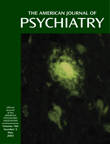Psychotherapy Shattered?
To the Editor: The article by Glen O. Gabbard, M.D. (1), elicited in me a momentary shattering of a little of my great regard for Glen Gabbard, who is the Gibraltar of scholarly support for the efficacy of psychotherapy. I believe while sharing with the patient his own horror of the events on September 11, that he should have withheld his testimony of having been frightened. What his fright meant to him certainly was different from what his confession of fright meant to her. He could have still been human with her by acknowledging that the event was frightening by indicating, with his calm acceptance of his patient’s panic, that the feelings could be mastered, as he himself had done. Menninger was right to say, “When in doubt, be human,” but another wise teacher added, “When in doubt, stop talking.”
1. Gabbard GO: Gibraltar shattered. Am J Psychiatry 2002; 159:1480-1481Link, Google Scholar



